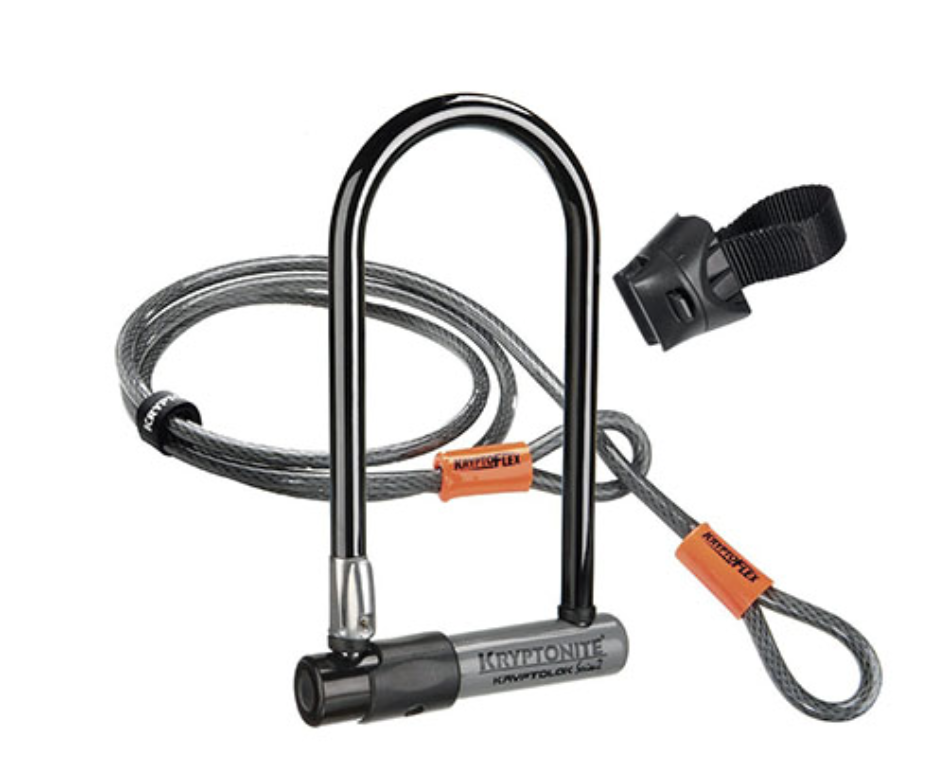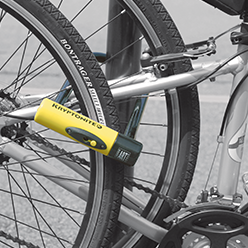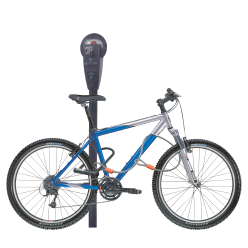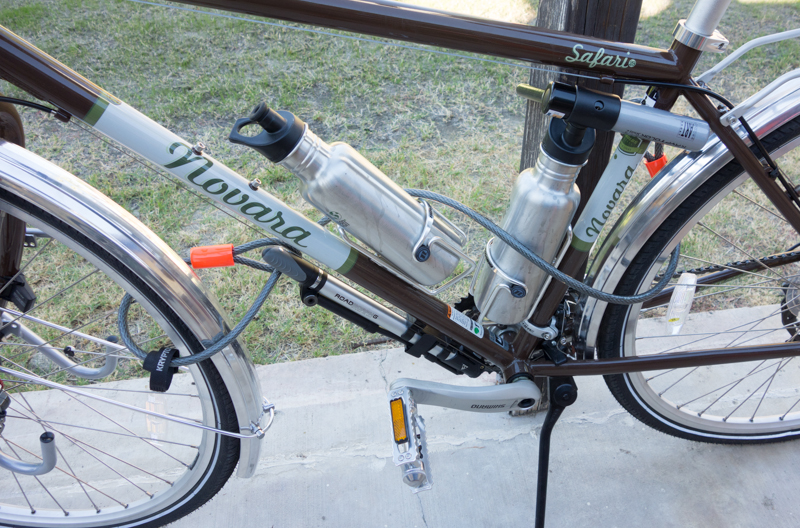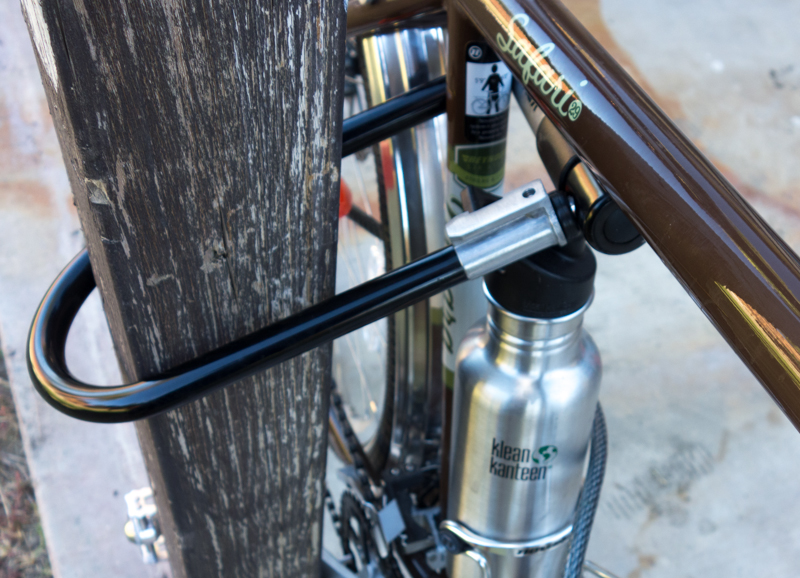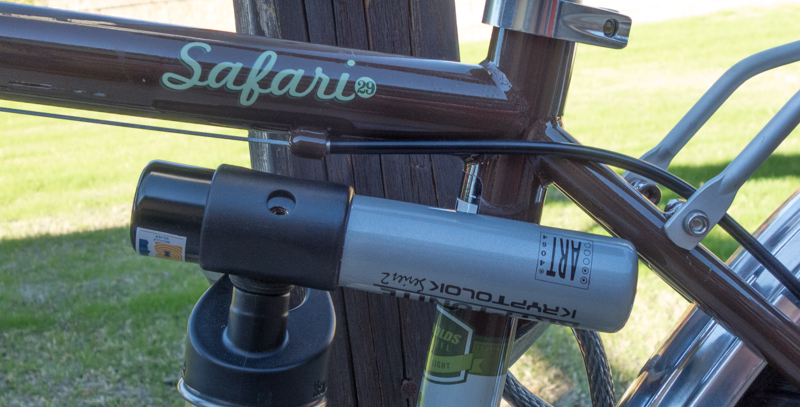Last year, when I bought our Novara Safari bicycles, a priority purchase was a lock or some other security device.
The fact a security device to protect a bicycle is a requirement to keep it from being stolen pisses me off.
This got me to thinking. Almost every person I know, who has owned bikes, has had one or more stolen. In the past I have had three bikes stolen from me and all were locked to prevent theft. So thus began a new research project.
AN EXERCISE IN FUTILITY?
Before I started looking, I already knew that if a thief wants your bike, there is probably very little you can do to protect it, other than keeping it close to you at all times and never sleeping. With a powered angle grinder and some time, no lock can keep a bike secure. But few thieves are going to invest in this type of equipment, and they are usually not going to try to steal a bike that costs under $1,000.
So the strategy to keep your bike is to deter the vast majority of would be thieves, those you aren’t carting around power tools. The best deterrent is a U style lock.
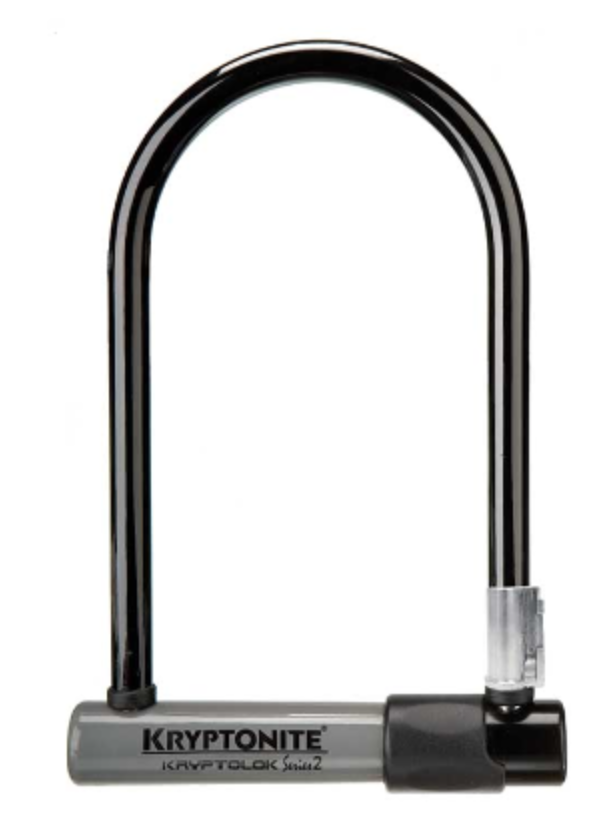
Critical Security Success Factor
More important than the lock itself is how you secure your bike.
The best method is to use two U locks, running each through a wheel and the frame. Two Kryptonite New York Fahgettaboudit Mini locks are probably the most secure solution, but at $100 each would be about 25% of the cost of my bike and a heavy solution of 10 lbs for the pair.
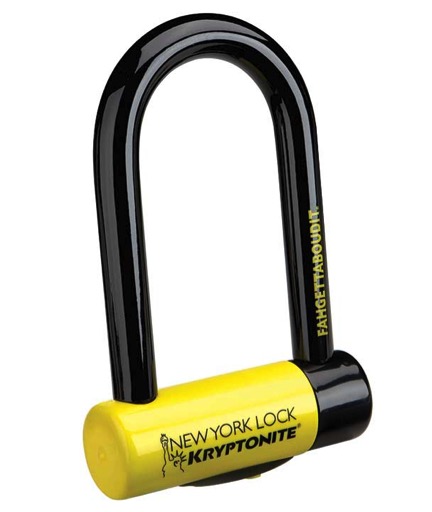
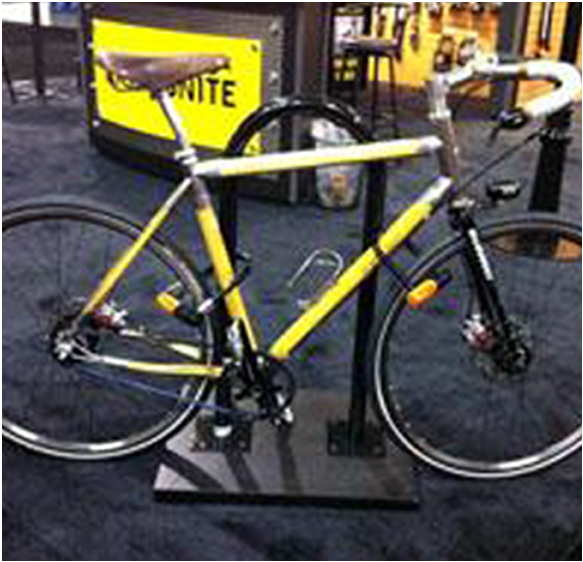
Good locks are heavy, and as in backpacking, most of us want to minimize weight while using gear that is functional. Given this, most bike owners are going to try to use a single lock.
With a single lock, the best method is to secure the bike frame to an immovable object. Better yet is to remove the front wheel placing it next to the rear wheel then running the lock through both wheels, the bike frame and then around the immovable object.
Second best is to use a U lock in conjunction with a cable and run the cable through the wheels.
I opted for the last option: a Kryptonite brand KrptoLok Series 2 with a 4-foot cable. There are more secure options, but this lock will keep my bike safe from the vast majority of bike thieves, and the remaining potential universe of serious bike thieves aren’t interested in my bike – it isn’t valuable enough.
In the picture above, the cable is looped through the front wheel, passes through the rear wheel and is secured by the U lock, which goes around the frame.
You want to make sure that the “immovable” object you secure the lock to cannot be disassembled or taken apart. I read about a person who ‘secured’ his bike to a stop sign pole. The thief simply took the stop sign off, which was mounted to the pole with two bolts, and then lifted the bike up over the top of the pole.
This exercise in bike security should lead to a dialog about why we must deal with these criminals in the first place.
WHY DO WE PUT UP WITH CRIMINALS?
Instead of a rational system to deal with criminals we resort to alarm companies, security hardware, insurance, and other Band-Aids as the solution.
It is interesting that many bike lock manufacturers include a theft guarantee as part of the purchase price. In reality, you aren’t likely to get reimbursed unless you comply with strict fine print requirements. And all of these companies, except Kryptonite, exclude a bike stolen in New York City from the warranty. Kryptonite will cover a NYC theft only if you bought and installed their most expensive lock, ironically named the New York Lock. Apparently bike theft in New York City is rampant and is probably soon coming to your city.
The great conversation of “why” we put up with criminals is complicated indeed. It boils down to a philosophical conundrum: What is the purpose of our lives and how should the individual act?
Our modern Western world society is lost, and everything we do is a contradiction. We are unable to see things as black or white, right or wrong. Because of this, our laws and social institutions are a mess. We do not have a rational moral code. Our pursuit of happiness is no longer important or moral. Being “our brother’s keeper” is the irrational altruistic replacement. We live in a muddy version of Les Miserables where the Valjeans of the world are considered to be the product of social injustice, not the criminals that they are.
An Example
In California, where I live, we spend over $50,000 per year on each prison inmate. Compare this to the amount we spend on education per student (up through high school): In California it is less than $9,000 per year. Seems we have our priorities mixed up.
What is worse, our prisons are mostly full of people who have committed “victimless crimes,” mostly drug convictions. Given the fact we have tens of thousands of laws on the books, one may want to question why there are so many laws – the answer being that we are trying to control the behavior of individuals for the elusive Common Good. I touched upon this subject earlier this year. It is more important that we ensure plastic bags are not given away at stores and it is more important that we have Water Nazis to spy on their neighbors than implement a legal system that works to remove criminals from society.
THE PURPOSE OF GOVERNMENT
Our forefathers had a dim view of government, but understood government was necessary to ensure each individual had a right to life, liberty, pursuit of their own happiness, and their property. The only purpose of a moral government is the protection of each individual’s rights. A government shouldn’t rule the people; the people permit the government to act as each person’s agent to protect these rights. As citizens, we give government our consent to govern.
As long as any individual does not restrict another’s right to these principals, all is good. We don’t need a lot of laws to accomplish this, and we should mandate our government to remove the vast majority of laws on the books, laws that are only in place to control us when the focus should only be the punishment of citizens who have restricted the freedom of another. If one initiates force against another (in all its iterations), then society has a right to punish that person, and the victim has the right to just compensation.
Given this fundamental principle, government truly should only have three functions: (1) a police force to protect citizens from criminals, (2) a court system to adjudicate disputes, (3) a military to protect our borders from foreign invaders. That’s it. Possessing drugs should not be a crime. Stealing or robbing to obtain the money to buy drugs is a crime.
Today our police spend so much time trying to catch drug users and sellers, and other victimless crimes; they have no time to worry about real crime. That is, criminals who restrict our rights, especially our right to our property. Thus they have no time to worry about bicycle theft, car theft, burglary and other crimes against us citizens. They are too busy writing traffic tickets and worrying about drug users. If your bike or car is stolen, the police have no time to solve the crime, and in the case of a stolen bike the owner usually doesn’t have good evidence of proof of ownership – a bicycle theft will usually end up as an unsolved crime – and unsolved crimes hurts the police’s crime statistics.
A Solution
So how do we change all of this? First, let’s get rid of the majority of laws and restrictions. Prosecute people who restrict the rights of others. Also, let’s change or mind set of purpose of prison: it is used to punish criminals, not rehabilitate them. So using bike theft as a simple example, we can extrapolate other punishments based on their severity.
Bike Theft: First Offense
- The criminal will pay the full retail value of a new replacement bike.
- The criminal will pay all courts costs (the real cost) to include the cost of the police.
- The criminal will pay the owner of the bike a $5,000 penalty.
- The criminal will pay the cost to house him while in prison.
- Prison sentence will be the length of time it takes the criminal to pay all of these costs.
- The criminal will be paid $10 per hour to work on projects beneficial to the protection of citizens. We can start by having prisoners building a wall along all our borders.
- Prisoners will work 8 hours per day, 6 days per week. No overtime pay.
- Prisons will have a cell with a bed, a sink, and a toilet. There will be no recreation, no libraries, no phones, and no visitors.
- Prisoners have no rights while in prison — they have forfeited their rights by engaging in criminal activities.
Additional Offenses
Each offense will include an additional $5,000 fine that will go to the general tax fund to reduce taxes of all taxpayers. So the second offence will cost the criminal $10,000, the third $15,000, and so forth.
